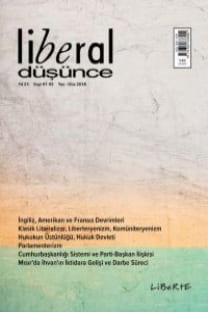Mardin Örneğinde Suriyeli Sığınmacılar: Türkiye’de Kalmak ya da Geri Dönmek
Return, , Integration, Migration, Syrian in Turkey, , Social Adaptatipn
Syrian Asylum Seekers and The Question of Living in Turkey or Returning to Their Home Country: Mardin Case
Sığınmacılar, Geri Dönüş, Suriye İç Savaşı, Göç, Türkiye’deki Suriyeliler,
___
- Acet İnce, G. (2020), Uluslararası Hukuk Bağlamında Fırat Kalkanı, Zeytin Dalı ve Barış Pınarı Harekatları Malatya Turgut Özal Üniversitesi İşletme ve Yönetim Bilimleri Dergisi , 1 (1) , 65-92 . Retrieved from https://dergipark.org.tr/en/pub/mtuiyb/issue/53412/681513
- Aktürk, Ş.(2019),Turkey’s Operation Peace Spring and the Battle for a Free Syria, Trt world research center, policy outlook, https://researchcentre.trtworld.com/images/files/policy_briefs/Turkey-Op-Peace-Spring.pdf
- Alptekin, H. (2019), Suriye’de Oluşturulacak Güvenli Bölgede Taraflar ve Tutumlar, Nisan 2019, sayı 278, Seta Analiz, https://setav.org/assets/uploads/2019/04/A-278.pdf
- Akkaya, C., Sarandöl, A., Esen-Danacı, A., Sivrioğlu, E.Y., Kaya, E. ve Kırlı, S. (2008), Sosyal Uyum Kendini Değerlendirme Ölçeği (SUKDÖ) Türkçe formunun geçerlik ve güvenilirliği. Türk Psikiyatri Dergisi, 19(3), 292-299.
- Anadolu Ajansı (2014),Yeni göç dalgaları kapıda https://www.aa.com.tr/tr/politika/yeni-goc-dalgalari-kapida/98227 (accessed on 01 March 2019).
- Bosc M, Dubini A, Polin V. ve ark. (1997), Development and validation of a social functioning scale, the Social Adaptation Self-evaluation Scale, Eur Neuropsychopharmacol, 7 (Suppl 1): 57-70.
- Baban,F. Ilcan,S. and Rygiel R. (2017), Syrian refugees in Turkey: pathways to precarity, differential inclusion, and negotiated citizenship rights, Journal of Ethnic and Migration Studies, 43:1, 41-57, DOI: 10.1080/1369183X.2016.1192996
- Bbc (2020), İdlib'de Türkiye ve Suriye ordularını karşı karşıya getiren çatışma hakkında neler biliniyor https://www.bbc.com/turkce/haberler-dunya-51355155 (accessed on 10 March 2020).
- Bosc M, Dubini A, Polin V. ve et. al. (1997), Development and validation of a social functioning scale, the Social Adaptation Self-evaluation Scale, Eur Neuropsychopharmacol, 7 (Suppl 1): 57-70.
- Cengiz, S. (2020), Assessing the Astana Peace Process for Syria: Actors, Approaches, and Differences. Contemporary Review of the Middle East, 7(2), 200–214. https://doi.org/10.1177/2347798920901876
- Deutsche Welle (2018), Türkiye’deki Suriyelilerin Geri Dönüşü Mümkün mü?’’ https://www.dw.com/tr/t%C3%BCrkiyedeki-suriyelilerin-geri d%C3%B6n% C3%BC%C5% 9F%C3% BC-m%C3%BCmk%C3%BCn-m%C3%BC/a-46297498 (accessed on 15 February 2020).
- Eren, E. (2019), Is Temporary Protection Eternal? The Future of Temporary Protection Status of Syrians in Turkey, July-December 2019 Volume: 9, No: 2, pp. 125 – 134.
- Global Trends Forced Displacement in 2018 UNCHR (2019), https://www.unhcr.org/statistics/unhcrstats/5d08d7ee7/unhcr-global-trends-2018.html (accessed on 03 March 2020).
- Hoffmann,S. and Samuk. S. (2016), Turkish Immigration Politics and the Syrian Refugee Crisis, Working Paper Research Division Global Issues, 2016/No. 01, March 2016 SWP Berlin.
- Hürriyet (2017), Suriyelilerin yüzde 80’i kalacak gibi duruyor’’ http://www.hurriyet.com.tr/gundem/malkoc-suriyelilerin-yuzde-80i-kalacak-gibi-gorunuyor-40336827 (accessed on 05 March 2020). Hürriyet (2019), Adalet Bakanı Gül: 315 bin Suriyeli memleketine döndü’’ https://www.hurriyet.com.tr/gundem/adalet-bakani-gul-315-bin-suriyeli-memleketine-dondu-41135354 (accessed on 01 December 2019).
- Hürriyet (2016), Cumhurbaşkanı Erdoğan: Suriyelilere vatandaşlık imkânı vereceğiz’’ https://www.hurriyet.com.tr/cumhurbaskani-erdogan-suriyelilere-vatandaslik-imkani-verecegiz-37304608 (accessed on 01 March 2020).
- Helms L., Femke Van Esch and Beverly C. (2019), Merkel III: From Committed Pragmatist to ‘Conviction Leader’? German Politics, 28:3, 350-370, DOI: 10.1080/09644008.2018.1462340
- Istanbul Governorship (2019), Düzensiz Göç, Kayıtsız Suriyeliler ve Kayıt Dışı İstihdam İle İlgili Basın Açıklaması’’http://istanbul.gov.tr/duzensiz-goc-kayitsiz-suriyeliler-ve-kayit-disi-istihdam-ile-ilgili-basin-aciklamasi (accessed on 24 December 2019).
- Kirişci, K.(2014),Syrian Refugees and Turkey’s Challenges: Going Beyond Hospitality. Washington, DC: The Brookings Institution. https://www.brookings.edu/wp-content/uploads/2016/06/Syrian-Refugees-and-Turkeys-Challenges-May-14-2014.pdf
- Kumaraswamy P. and Manjari Singh (2017), Population pressure in Jordan and the role of Syrian refugees, Migration and Development, 6:3, 412-427, DOI:10.1080/21632324.2016.1141500
- Loveluck,L.(2019), Assad urged Syrian refugees to come home. Many are being welcomed with arrest and interrogation https://www.washingtonpost.com/world/assad-urged-syrian-refugees-to-come-home-many-are-being-welcomed-with-arrest-and-interrogation/2019/06/02/54bd696a-7bea-11e9-b1f3-b233fe5811ef_story.html (accessed on 20 April 2019).
- Mckay, H. (2019), Turkey to create 'safe zones' in Syria - with or without US support’’ https://www.foxnews.com/world/erdogan-insists-safe-zones-in-syria-will-enable-refugee-return-others-express-skepticism (accessed 01 February 2020).
- Onder, H. (2020), The Mobility of Displaced Syrians An Economic and Social Analysis, World Bank, https://www.worldbank.org/en/country/syria/publication/the-mobility-of-displaced-syrians-an-economic-and-social-analysis
- Parker, J.(2019),Between Russia and Iran: Room to Pursue American Interests in Syria, Center for Strategic Research Institute for National Strategic Studies National Defense University, https://css.ethz.ch/content/dam/ethz/special-interest/gess/cis/center-for-securities-studies/resources/docs/INSS_Strategic-Perspectives-27.pdf
- Special Report for Syrians in Turkey (Ombudsman Institution) (2018), Türkiye’deki Suriyeliler Özel Rapor, https://www.ombudsman.gov.tr/suriyeliler/ozel_rapor.pdf (accessed on 15 April 2019).
- Syrian Regional Refugee Response(UNCHR)(2019), https://data2.unhcr.org/en/situations/syria/location/36 (accessed on 31 December 2019).
- Turkish Statistic Institute (TSI) (2020), Turkish Population http://www.tuik.gov.tr/HbGetirHTML.do?id=33705 (accessed on 23 February 2020).
- Turkey Grand National Parlament (TGNP)(2019),Göç ve Uyum Raporu’’ https://www.tbmm.gov.tr/komisyon/insanhaklari/docs/2018/goc_ve_uyum_raporu.pdf (accessed on 01 March 2020).
- Tanrıkulu, F. (2018), Suriye Krizi Sonrası Türkiye’deki Sığınmacıların ve Göçmenlerin Eğitimi: Geçmiş, Bugün ve Gelecek Perspektifleri”, Hitit Üniversitesi Sosyal Bilimler Enstitüsü Dergisi, sayı 3.
- ISSN: 1300-8781
- Başlangıç: 1996
- Yayıncı: Liberte Yayınları
Sosyalist İktisadi Hesaplama Tartışması: Metodolojik Bir İnceleme
Bütçe Hakkının Cumhurbaşkanlığı Sistemindeki Görünümü ve Latin Amerika Ülkeleri ile Mukayesesi
Mardin Örneğinde Suriyeli Sığınmacılar: Türkiye’de Kalmak ya da Geri Dönmek
Münür BİLGİLİ, Ali Osman KOCALAR
Syrian Refugees and Peaceful Coexistence: Dining Spaces as Contact Points
H. Bahadır AKIN, Yılmaz SEÇİM, Seyma AKIN
